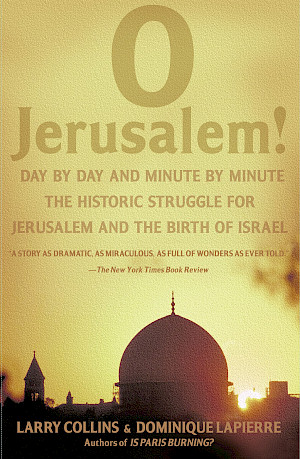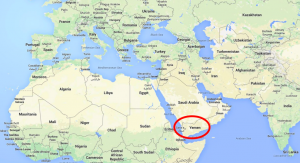The Never-Ending War
June 03, 2021I was 10 years old when the 1967 Six-Day war broke out between Israel and its Arab neighbours. I recall watching Walter Cronkite on the CBS Evening News reporting on this major event. With the (sometimes helpful) simulcast commentary from my father that accompanied every broadcast, I received my first education on the Israeli-Palestinian conflict. Since then it’s been an issue that I have followed closely throughout my life. I find that most people in our part of the world are unfamiliar with the roots of the Israeli-Palestinian conflict. The western media certainly don’t make it easy to get a clear understanding of the situation.
In the early 1990’s, and long before I founded Lionsgate Entertainment, I was already dabbling in the movie business. My then business partner and I acquired an option for film rights to the book “O Jerusalem”, by Larry Collins and Dominique Lapierre.
 The book lays out a moment by moment recount of the process that gave birth to the state of Israel, including the story of the Battle of Jerusalem in the first Israel‐Arab war, in the spring of 1948. Written in 1972, this brilliant book tells the story from all three perspectives; the Jews, the Arabs and the British, who also participated in that war. The authors conducted hundreds of interviews with individuals that had witnessed the events leading up to 1947-48. I highly recommend this book as it will give you a great background to why the region is still in conflict today.
The book lays out a moment by moment recount of the process that gave birth to the state of Israel, including the story of the Battle of Jerusalem in the first Israel‐Arab war, in the spring of 1948. Written in 1972, this brilliant book tells the story from all three perspectives; the Jews, the Arabs and the British, who also participated in that war. The authors conducted hundreds of interviews with individuals that had witnessed the events leading up to 1947-48. I highly recommend this book as it will give you a great background to why the region is still in conflict today.
My business partner and I toured Israel and visited many sites where important events from that war took place. Israel is a beautiful country, laden with rich history. Like many who visit Jerusalem, I was fascinated by its long history as a holy city for all the major religions. I wanted to visit Bethlehem which is in the West Bank, but given it was at the tail end of the first intifada, we were told it was too dangerous. Had I gone, I suspect I’d have witnessed a less pristine side of Israel, to say the least. Conditions in the occupied territories continue to be dismal and getting worse, especially with the blockade of Gaza.
My business partner and I wanted to create a big budget epic film, but had different opinions on how to tell the story. He thought the war movie “The Longest Day” was the best way in which to design the film. I wanted a “Doctor Zhivago” approach, where a fictional romance overlays the factual events in the background. We hired John Brile, who had won the academy award for writing the screenplay for Gandhi to take a shot at it. It was a horribly expensive exercise that we would never get off the ground. It was eventually made by someone else in 2006 as a low budget film. It bombed.
Despite our failed project, reading the book and making that trip along with all the conversations that followed gave me a solid understanding of the history of this region and its people. I think it’s fair to say that Middle East history is, well, complicated.
A brief recap:
The Jewish people endured two millennia of exile, persecution and pogroms before the Zionist movement, which began in the late 19th century, ignited the dream of a homeland. The British helped pave the way to the realization of this dream by issuing the Balfour Declaration during the First World War. British concerns were more geopolitical than ideological, but regardless, 30 years later, Israel was born. It was a historical achievement , but the creation of Israel also meant the displacement of an entire population. Palestinians and Israelis have never experienced a peaceful co-existence. The first four wars that lasted until 1973 were with Arab neighbouring countries, where Israel prevailed and expanded its territory. What followed were decades of terrorist activities and many failed attempts at a Palestinian solution. Since 1987, there have been two prolonged intifadas and four wars between Israel and various Palestinian factions.These wars tend to create a lot of suffering and resolve nothing.
The closest these two groups have ever come to a permanent solution occurred during the Clinton administration.
The “Declaration of Principles” in 1993 was the first agreement between the Israelis and Palestinians towards ending their conflict and sharing the holy land between the River Jordan and the Mediterranean Sea that they both claim as their homeland. Then Israeli Prime Minister Yitzhak Rabin declared, “enough of blood and tears” at the signing ceremony. But his courageous attempt at peace wasn’t popular with everyone back home in Israel. And in 1995, he was assassinated by a right-wing Jewish extremist. After Rabin’s death, Clinton tried to continue the peace process with his successors, but for a number of reasons, the will and desire for peace was no longer there. I became friends with Bill Clinton after he left office and I know that the failure to achieve a long term Middle East peace was his biggest disappointment of his time as president.
A must-see documentary film is “The Human Factor” by Dror Moreh. He screened it for us at an International Crisis Group event two years ago. The film is a behind the scenes look at three decades of the Arab-Israeli peace process via the veteran diplomat mediators and negotiators who put in obsessive hours of legwork and travel to inform and support U.S. presidents and Israeli, Palestinian, and Syrian generals, politicians and prime ministers who take credit or blame for often disappointing results.
The main thesis of the film is that there is a human element to success and failure when it comes to making peace. The human factor is key. How the participants in the peace negotiations came to respect each other, despite the hatred that still existed after decades of conflict, was key to the 1993 accord. It was the right people at the right moment in time. And we haven’t seen that kind of courage and leadership since.
Over the past 20 years, the parties haven’t gotten even nearly as close.. The issue disappears from the news unless there’s a war. There is currently no motivation or incentive for Israel to pursue a long term peace agreement ,even though its losing its international standing. The Palestinian political system is broken ,leaving it unable to set strategy and negotiate on behalf of its own people. The US too is distracted by mostly domestic problems and political dysfunction. For some, America’s role as an honest broker in the past has been debatable. In my experience, those who question America’s steadfast backing of Israel--on moral grounds or otherwise--draw accusations of being 'pro- Palestinian' or 'anti-Semitic.The reality is that we need is to be pro-truth and anti-war. Having said that, without America’s leadership and participation, there is little hope for a long term solution.
So, we wait. Sadly, the issue will not magically disappear. The world can’t just close its eyes and wish the problem away. We just witnessed another deadly engagement between Israel and Hamas which brought the tragedy home again. Israel’s use of force is attracting a lot of international criticism, but seemingly not enough to motivate it to look for a long-term solution.
For the moment Hamas and Israel have agreed to stop the rockets and bombs, but the occupation, which is violent, continues. And it's only a matter of time before the situation explodes again.
Until there is a willingness by the world community and some courageous leadership on all sides, we will continue to see outbreaks of deadly conflict in the ensuing years. The Six-Day war which gave me my first introduction to this conflict was over 50 years ago. It would be tragic if my children are still talking about this conflict in another half century.










